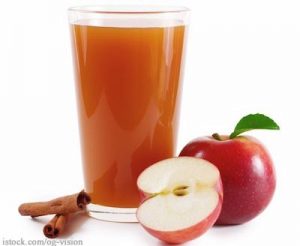According to the Johnson County Public Health department in Iowa, an outbreak of cryptosporidiosis, a disease caused by the parasite Cryptosporidium, is linked to unpasteurized apple cider. All of the eleven ill persons are recovering. One person was hospitalized. This illness outbreak is the latest in Iowa this year; more than 1,200 people have been sickened with cryptosporidiosis this year in that state.
 Unpasteurized apple cider, like unpasteurized milk and cheese, is a health risk. Doug Beardsley, Johnson County Public Health Director, said in a statement, “You can’t tell if cider is contaminated just by looking at it. In fact, there is no difference in taste or smell either. The key to preventing illness associated with apple cider is purchasing product that has been pasteurized, or by heating unpasteurized apple cider to at least 170 degrees F or until it boils.”
Unpasteurized apple cider, like unpasteurized milk and cheese, is a health risk. Doug Beardsley, Johnson County Public Health Director, said in a statement, “You can’t tell if cider is contaminated just by looking at it. In fact, there is no difference in taste or smell either. The key to preventing illness associated with apple cider is purchasing product that has been pasteurized, or by heating unpasteurized apple cider to at least 170 degrees F or until it boils.”
Public health officials are urging the public to avoid this product. Unpasteurized cider is usually purchased freshly pressed from orchards, roadside stands, and farmer’s market. Don’t assume that just because the juice is hot or bottled that it’s safe. Unpasteurized cider may be sold, but it must be clearly labeled “unpasteurized”. In addition to Cryptosporidium, unpasteurized cider can contain E. coli O157:H7, Salmonella, and some viruses. Any bacteria on the outside or outside of the produce will become part of the finished product if the fruit or vegetable is made into juice.
The symptoms of cryptosporidiosis include stomach cramps, nausea, vomiting, watery diarrhea, and low grade fever. If you consumed unpasteurized apple cider or if you see unpasteurized cider sold without a label, call Johnson County Public Health at 356-6040. Always read the label when purchasing fruit or vegetable juices, and when in doubt, ask the vendor if the product has been pasteurized. Unpasteurized juices can carry pathogenic bacteria that can make you or your children sick.




